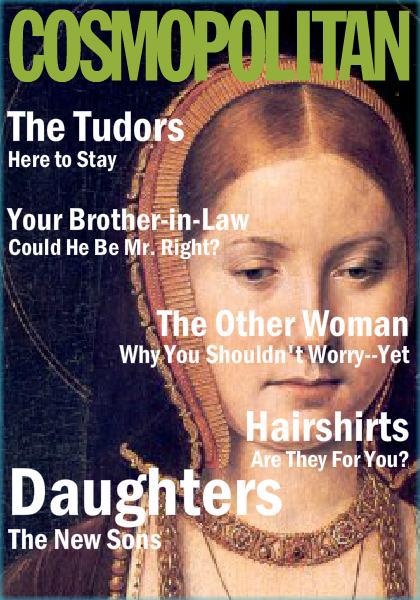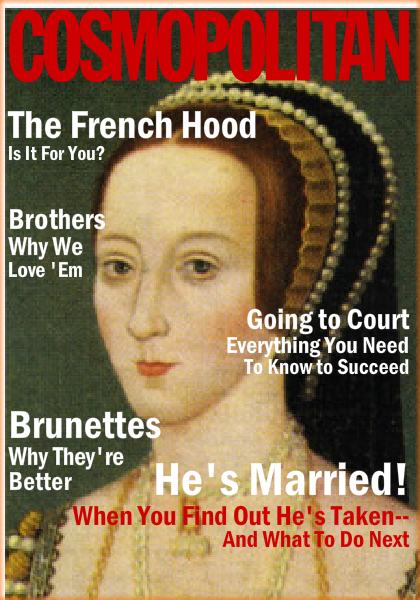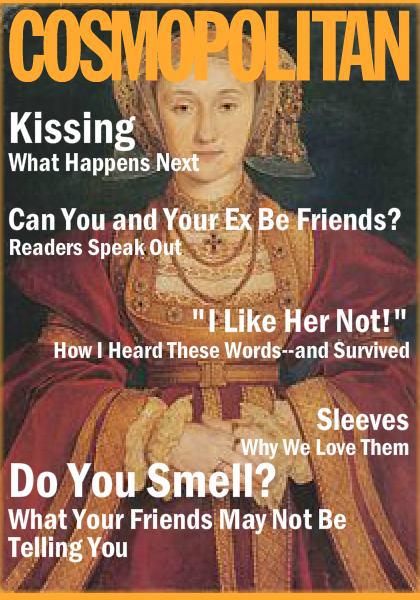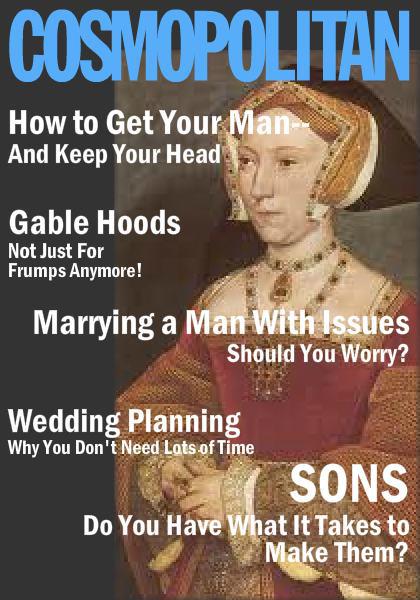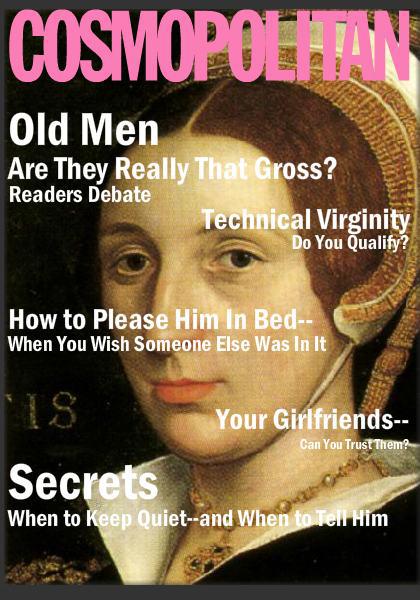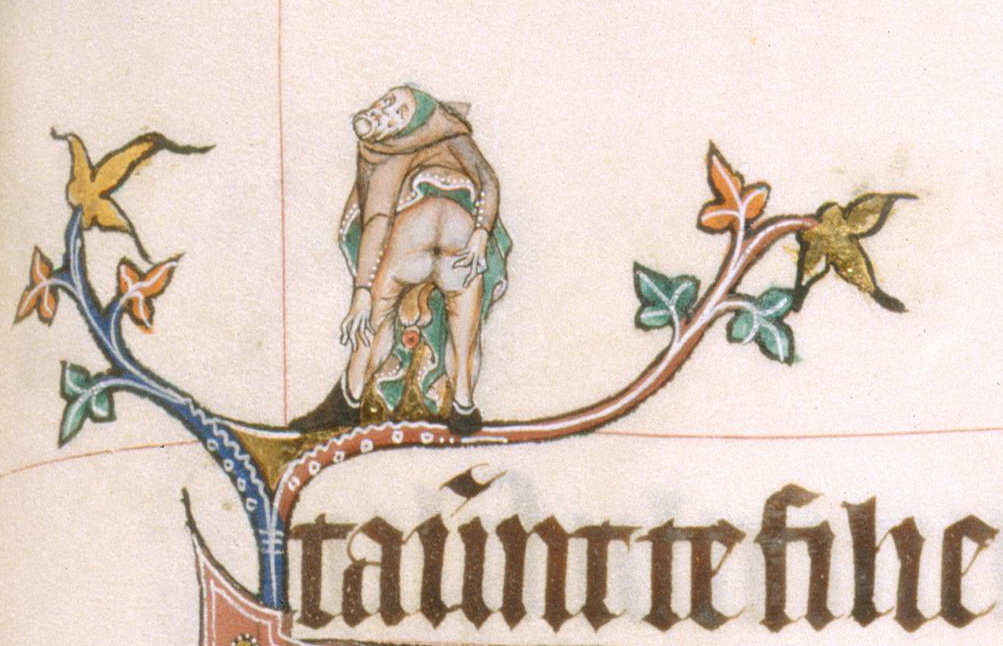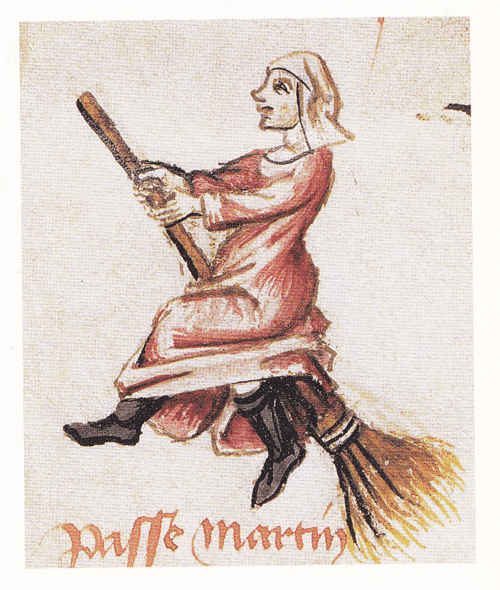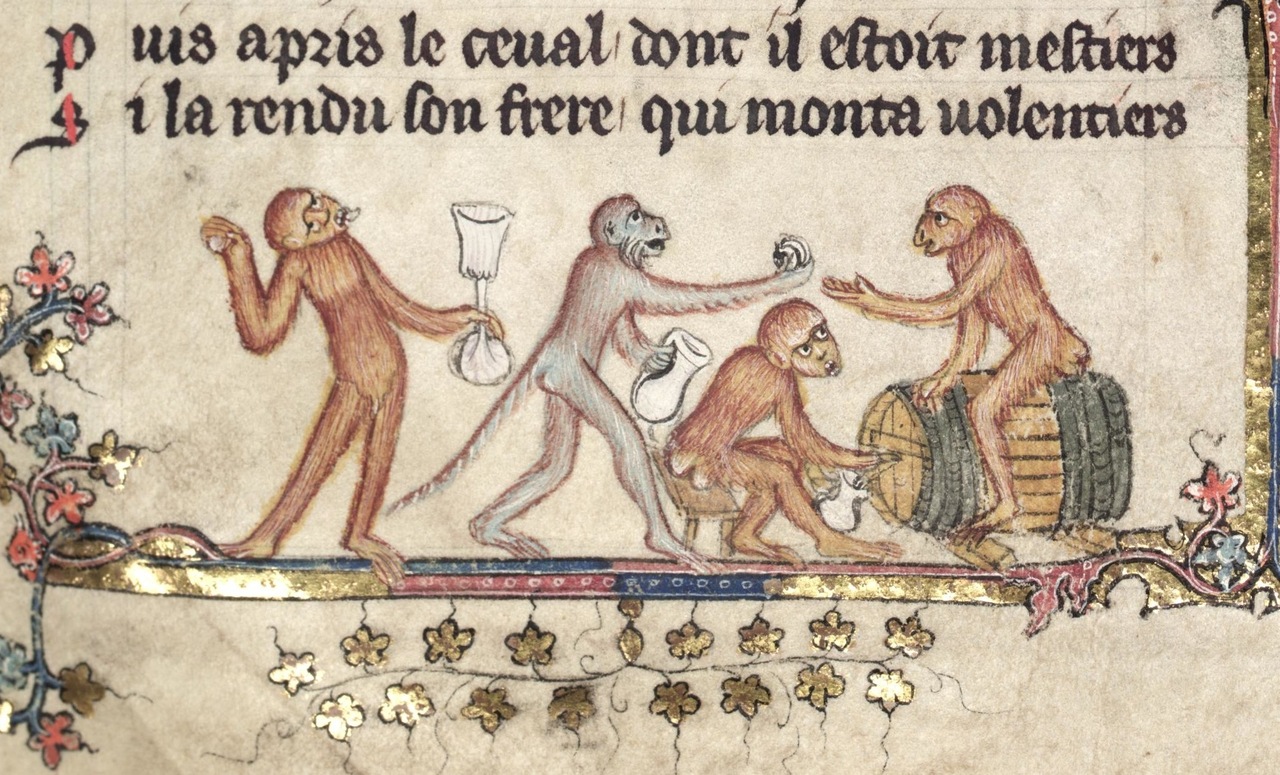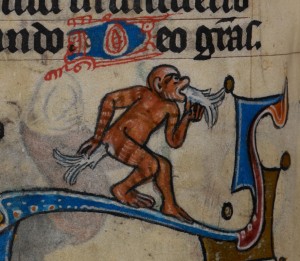Tag Archives: medieval
Medieval Goatse, oh my!
I’m sitting here asking myself – what was going on in those Medieval monasteries? Seriously? Even though the image seems to err.. complement? the accompanying text (below), how does one reconcile this image with the fact that it was very likely have been produced, and viewed, by persons who had devoted themselves to lives to piety, prayer and scholasticism? At first glimpse I thought it might have something to do with Absolon who did infamously kist Alisoun’s nether yea in The Miller’s Tale, from Chaucer’s Canterbury Tales. But not so, it seems this moonish illumination derives from a Medieval romance called The Conversations of Solomon and Marcolf.
The concept of monks writing out racy romances feels more than a little absurd… and totally incongruous with our general perceptions of Medieval monks and their life of studious solitude, self deprivation (not to be confused with depravation!), and celibacy!? Makes you wonder, what on earth were they thinking? And also… what really went on, in ye olde monasteries? O_o
From the dialogue of Solomon and Marcolf:
‘The king Salomon discended from hys hors and began to loke into the oven. Marcolphus laye all crokyd, hys vysage from hymwardes, had put downe hys breche into hys hammes that he myght se hys arshole and alle hys othre fowle gere. As the kyng Salomon, that seyng, demawnded what laye there, Marcolph answeryd: I am here. Salomon: Wherefore lyest thou thus? Marcolf: For ye have commaunded me that ye shulde no more se me betwyxt myn yes. Now and ye woll not se me betwyxt myn yes, ye may se me betwene my buttockys in the myddes of myn arsehole.’
Gorleston Psalter, England 14th century (British Library, Additional 49622, fol. 61r)
TIL… lots of cool stuff.
Today I learned that that even though we think we are living in an enlightened age of reason, science and technology, there are so many element intrinsic to Western thinking that might as well be purely Medieval. For example, attitudes towards rape and rape victims really havent changed that much over the last 500 years. In Renaissance Italy, the bulk of rape incidents happen by a known perpetrator and often in the victims own home, and usually went unreported as the shame and stain on a woman’s character was detrimental to her future. Women were still frequently considered to have ‘asked for it’, if she has allowed her person to be alone, unguarded, unprotected (fryndlesse) or dressed provocatively. Many rapists felt they have done nothing wrong and are therefore not repentent about their crimes, this was particularly evident in the case in group or gang rapes where the male agressor/s gain acceptance and reinforcement of their overt masculinities from their cohorts. Women of lower/servant classes or disenfranchised minorities were often at very high risk of sexual assault due to the protection afforded to their ‘betters’ or more monied counterparts… any of this sounding familiar? Yep, many of these aspects of rape mentality haven’t gone very far at all, particularly in some of our modern global cultures.
I also learned that eating disorders and anorexia tended to affect the same demographic of young woman in Puritan England that it does now… young women from well to do backgrounds, often with very religious backgrounds whose primarily emotional disturbance is doubt – primarily self doubt. In Puritan England it was their burgeoning sexuality and the subsequent conflict with their piety that caused that self doubt and following self loathing. Prescriptions for such melancholias included fasting… but many young women took the fasting treatment as seriously as they took their religion and then endured long term battles with willing periods of not nourishing their ‘traitorous bodies’ that were full of lust and potential for sin. Modern day women (in the US at any rate, stats for Australia not available due to overzealousness of political correctness) are from the same demographics – tend to be from middle to upper class families with heavy religious backgrounds and similar expectations. Confusion arises in young teens when puberty, adolescent angst and sexual experimentation leads to self and body perception issues. Similar results ensue for many sufferers… years of fighting with a very serious condition that results from emotional dissatisfaction and disconnection from one’s own body.
Today I learned that post-partum depression, while much more widely acknowledge and recognizable in modern society, was just as present in Medieval life as it is today. Perhaps even more so as women had so many children. Margery Kempe was literally driven mad after the birth of her first child and in the absence of medical or psychological treatment turned to friends, family and townspeople for support. Eventually she turned to Christ for salvation and claimed it was only His divine intervention and her continued desire to please Christ that kept her from relapsing through the birth of her next 13 children. But she ended up mad as pants in the end anyway according to her neighbours – which is by way of saying, she became one of those ‘uppity’ women of the Middle Ages who refused to be controlled by the social constraints of the time. And after 14 kids, I think she deserves to be as free and uncontrolled as she wants to be!
I also learned that witches had consensual and emotionally fulfilling, sometimes long term, sexual relations with devils and demons that visited them in the night to ‘suckle at their genitalia’! That presumed witches don’t float for a reason (but that’s a much longer story for another time) and that witch-hunting was a systematised and very lucrative business. 🙂
This conferences has been so full of amazing papers, wonderful people and interesting facts that I can’t wait for the next one – which is at the University of Queensland in 2015.
The Uses of Violence…
- Rape and Ritual in Renaussance Italy: The Normalization of Violence?
- “What shee hath often seene”: Family Violence in Pre-Modern Ireland
Witchcraft in Translation…
- The Witch-Finder General: The Matthew Hopkins Pamphlett.
- Sleeping With Devils: The Sexual Witch in the Seventeenth Century England.
- Glanvill in Germany: Translating an English Debate on Witchcraft and Spirits.
Medieval and Early Modern Echoes in Healthcare…
- Margery Kempe and Postnatal Psychosis: Going ‘owt of hir minde’.
- Vesalius Writing on the Body of Medicine: from translation to Direct Observation.
- Puberty and Eating Disorders in Puritan England.
Qualities of Kings: The Representation of Medieval English Monarchs…
- The Portrait of Henry the Young King in the History of William Marshall.
- How to Construct a King: The Correspondence of Edward I and Llwelyn ap Gruffydd
- ‘Sodenly he was changed into a new man’: The Self-fashioned Masculinity of Henry V
If I’m ever in trouble, I want this guy to defend me.
The ANZAMEMS conference has been awesome. I have attended some fantastic papers on lots of interesting topics. It turns out that we are not going to be getting access to the conference papers at the end and they’re not being published anywhere… which is a bit disappointing given it’s impossible to get to all the sessions. I imagine the big conferences like Leeds would be even worse for trying to picking and choosing which panels to attend. Oh well, thems the breaks. I went to panels on –
Thinking Through Animals
- Robert Henryson’s fabulous ‘Maner of translatioun”: ‘perfite studie” getting “science”.
- Anthropomorphism: Animal versus Human Nature in William Baldwin’s ‘Beware the Cat’ and William Caxton’s ‘The History of Reynard the Fox’
- Prosecuting Animals as Criminals in Late Medieval Europe*
Heresy, Witchcraft and Deviance
- The Cultural Work of Witchcraft – Salem 1692
- The Cultural Translation of Demonic Possession from England to Bermuda: “A True Narrative of the Grevious Afflicition of Roger Sterrop in Somer Islands”
- “Arnalda de la Motta: The Ministry of a Female Perfect
Gendered Practices
- Til Death Do Us Part – Practice of Divorce during the Merovingian period.
- English Cistercian Nuns and their Interactions with Cistercian Commissioners and the Cistercian General Chapter in the 15th-16th Centuries.
- Grandmothers and Granddaughters: Four Generations of Medici Women at the Grand Ducal Court
I learned lots of cool stuff yesterday including but not limited to the fact that the Christian Church during the Merovingian period would absolutely not tolerate bigamous relations in amy form amongst royal families at the time, however incestuous ones, so long as they were formed before the Church knew anything about them were pretty much in the clear.
The Eleanora of Aragon was a lot tougher and smarter chicky then I knew her to be and she really doesn’t get enough credit for running the entire kingdom while her husband was off gallivanting about at war. Same of the Medici broads, generations of them effected royal houses for centuries and they ranged from being the most forebearing and hard done by, to being powerfully manipulative and sympathy worthy political pawns!
*The most interesting talk I heard though was on ‘Prosecuting Animals as Criminals in Late Medieval Europe. In 1522, in Autun France, the local townspeople sued the town’s rats for having eaten and created great damage to the town’s granaries. The rats were duly given a lawyer, one Bartolome Chaussime (who would later become the Chief Justice of the Supreme Cout in Provence) and the trial was conducted exactly like any other. The day of trail arrives and unfortunately the Defendants failed to appear in court. Chaussime, clever lawyer that he is, claimed his clients refused to attend court due to the prejudicial language in the summons which called them ‘dirty, grey, scoundrelous thieves’. The judge was forced to agree and held the trial date over saying the Claimants would have to moderate the language in the summons in order to reflect the not yet proven guilty status of the Defendants… and a new trial date was set.
On the next trial date, there was once again, a notable absence of Defendants in the courtroom. At this point the townspeople were outraged, but the lawyer for the Defence calmly stated that his clients were confused, that the writ of summons was too vague that among themselves, they did not know which of them needed to appear in court, that they thought others of their community would be in attendance and that the net result is that none attended! The judge agreed and instructed the Claimants to be more specific in identifying their wrong-doers so that a proper summons might be drafted and a new court date set.
The next court date duly arrived (you can really tell the court appointed lawyer is being paid by the hour!) and still there was no Defendants. On this occasion Chaussime argued that his clients being largely illiterate had not been able to read if the summons applied to them as individual rats of the town of Autun and therefore had not been able to understand if they were required. The judge, in his wisdom, agreed that this of course was a conundrum and decreed that the summons should be read from every pulpit in every church throughout the town for two weeks before the next court date could be set. Thus the trial was further delayed.
Finally, yet another court date occurred, and by now it was turning into quite the public spectacle. And yet, on this occasion, again the Defendants failed to appear! Their clever lawyer however said that his Clients, the rats, could not appear in court due to fear for their lives from the cats belonging to the good townspeople of Autun, and it was fear of capture and/or persecution that kept the rats from attending the court. At which time also, the clever Chaussime applied to the court for a guaranteed right of safe passage and a protection order to enable the rats to attend court – this would involve the townspeople restraining, binding or otherwise keeping in their cats for the duration.
Well, this the townspeople thought was ridiculous! (LOL) And they flatly refused to bind their cats in order that the rats might be able to attend court and rightly be brought to justice for their heinous crimes committed in the granary and against the townspeople of Autun… therefore the judge was forced to dismiss the case!
The whole thing is so exquisitely absurd that you couldn’t make it up if you tried. There were also lots of other examples of animal trials in the Medieval period, including a tragic and slightly alarming story about a sow. But there have been awesome little gems of information in every presentation like this… so I am having a ball! If I can find the time I am considering doing some research into animal trials myself and may perhaps do a research collegium at Festival if people are interested. 🙂
Roman d’Alexandre, Tournai, 1338-1344. (Bodleian Library, MS. Bodl. 264, fol. 94v)
Couldn’t find a manuscript image of rats in the granary on short notice, so I’ve given you monkeys into the wine instead! 🙂
Medieval people everywhere!
What a huge day. I love this medieval conference stuff… it’s like going to an SCA collegium weekend but run by crazy people (well even more crazy than usual) who spend their entire lives dedicated to research the most out of left field, bizarre niche shit you can imagine!
Today I attended seminars on these topics:
Emotions of Crime and Death in Medieval and Early Modern Europe…
- Benefit of Clergy: Complexities of Mercy and Emotion
- Pro Timore: Criminal Suicide in the Middle Ages
- “Because I loved that husband of mine”: Early Modern Witchcraft Trials for Sources of the History of Emotion.
Translating Medieval Thought…
- From Aristotle to the Heaven of the Moon: Dante on Acting against Conscience
- Translating of the Spirit: The Birth of Religious Orders and the High Medieval Rationalization of Spiritual Identity
- Nature Law and Reason : Models of Moral Action between XII and XIII century
Courtly Cultures in Translation…
- Not Lost In Translation: Aragonese Court Culture on Tour
- Eleanor of Aragon and her Spanish interpretation of the Role of the Princely Consort.
- The Representation of Female Power and Co-Rulership in Fifteenth Century Ferrara.
- Instructing the Next Generation: Eleanora of Aragon and her Daughters
And a keynote address by internationally renown art historian, Anne Dunlop…
European Art and the Mongol Middle Ages: Two Exercises in Translation
And I hate to think that each each session had seven panels running at the same time so I have only managed to see the tip of the iceberg. It’s so hard to choose which panels to go and see. For anyone interested in Medieval and Early Modern studies in the Australia/New Zealand, I highly recommend joining this organisation – ANZAMEMS. You will get on their mailing list, gain access to the back catalogue of the Parergon journal that they publish and keep an eye out for info on next years’ conference which I believe is being hosted in Brisbane, Queensland… and it’s totally open to independent scholars (ie: people not officially currently associated with an education institution).
It’s been a huge day and I can’t believe I get to see more amazing research papers presented tomorrow. So yay, more Medieval fun tomorrow, but for now… I am le tired.
Voracious Monkey Puts a Fish in the Arse
Book of Hours (‘The Maastricht Hours’), Liège 14th century.
British Library, Stowe 17, fol. 83v

